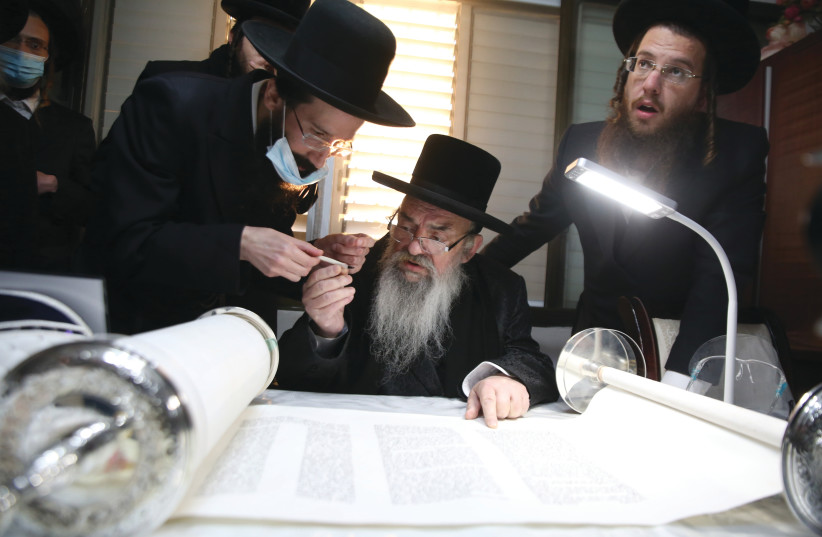There is a famous story in tractate Sanhedrin in which the sage Rabbi Yehoshua Ben Levi asks Elijah the prophet “When will the Messiah come?”
Elijah reveals to him that the Messiah is sitting at the entrance of the city of Rome among the poor people who suffer from illnesses. Rabbi Yehoshua immediately goes to find the Messiah and asks him when he will reveal himself to the people. The Messiah answers “today.” When Rabbi Yehoshua returns to Elijah he complains that the Messiah lied to him since he has not come. Elijah then explains what the Messiah meant. He will come “today, if you will listen to his voice.” In other words, any day can be the day the Messiah comes if you are aware of such a possibility and choose to listen to what it asks of you.
This ties in well with a theme that runs throughout the book of Deuteronomy and is particularly evident in the last few Torah portions that are read appropriately around the month of Tishrei holidays. Moses poignantly and repeatedly uses the word “today” on the eve of his death as he leaves important instructions for the nation as they prepare to enter the land of Israel.
What is powerful about the usage of “today” is that it is not meant to be limited to a particular time and place. There are clear allusions in the language of the text to the revelation at Sinai as well as to a future in the Land of Israel. Moses suggests one long day connecting us backwards and forwards on a time continuum. Any day that we show awareness of our responsibility, accountability and connection to establishing the covenant of Torah and mitzvot between us and God is “today.” Each moment simultaneously connects us backwards to Sinai as well as forward into the space created after that moment passes and onward into the future. In essence, any moment can be the moment that we change the trajectory of our actions, our behaviors, our relationships with one another, our relationship with God.
There is enormous importance to the invitation of “today” if we only open ourselves up to such a possibility. It is such a powerful mechanism that it can bring about redemption.
This is further reinforced in the Torah portion of Nitzavim where we read the following verses:
Deuteronomy 30:11-15 (Sefaria)Surely, this Instruction which I enjoin upon you this day is not too baffling for you, nor is it beyond reach.It is not in the heavens, that you should say, “Who among us can go up to the heavens and get it for us and impart it to us, that we may observe it?”Neither is it beyond the sea, that you should say, “Who among us can cross to the other side of the sea and get it for us and impart it to us, that we may observe it?”No, the thing is very close to you, in your mouth and in your heart, to observe it.
A COMMON interpretation of the instruction referenced in this passage is that it refers to repentance or returning to God after turning away. Here too the word “today” is used. And the Torah reminds us that the actions needed to facilitate return are within us at all times. However, they can only become actualized when they are brought out from the heart through the mouth and become something concrete through words and then actions. In my opinion, this mitzva is the key to the sustainability and survivability of the entire covenant outlined by Moses throughout Deuteronomy. Without a framework for reconciliation and reconnection after rupture, we could never sustain long lasting relationships with one another let alone with God.
This too is worthy of the word “today.” It inspires us to make the effort and be present in the exact moment when we acknowledge the potential latent in the concept of returning as well as the effort demanded of us to turn the potential into a reality.
There is a beautiful passage in a hassidic work by Rabbi Shmuel Borenstein that talks about the necessity of a cycle of three which includes past, present and future in order to grow spiritually. This he writes is symbolized on Rosh Hashanah by the blasts of the shofar which separate our past from our future through the middle set of blasts – shevarim and teruah which represent the present. To my mind, it is significant that the middle blasts are broken sounds in contrast to the unbroken blast of teruah. This suggests that there is a wholeness to the past and there can be wholeness in the future but in the present moment it is crucial to confront our brokenness in order to effect change. Put differently, we need to deconstruct ourselves and gaze at our different parts in order to put them back together in a deeper more meaningful, more significant way. As human beings, there is always what to examine and reshape, reorient and reconcile as we strive for greater authenticity in integrating the different pieces of ourselves into our striving to enact change that moves from within to without.
A big part of preparing for this time of year is articulating who we are today when we choose to work towards greater commitment, connection and accountability to God and to one another. To end with a quote from Rabbi Adin Steinsaltz, “Broadly defined, teshuvah is more than just repentance from sin; it is a spiritual reawakening, a desire to strengthen the connection between oneself and the sacred. All forms of teshuvah, however diverse and complex, have a common core: the belief that human beings have it in their power to effect inward change.”
May we use this time of year to effect inward and outward change that helps bring some aspect of redemption.
Shana Tova!
The writer teaches contemporary Halacha at the Matan Advanced Talmud Institute. She also teaches Talmud at Pardes along with courses on Sexuality and Sanctity in the Jewish tradition.

